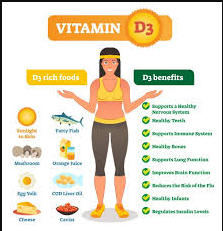The Numerous Health Advantages of Vitamin D3
The benefits of d3 vitamin differ from one person or study to another, as is the case with most medical matters. A sufficient amount of vitamin D3 appears to be essential for maintaining bone density and facilitating adequate immune system function, according to several research.
Vitamin D’s protective effects can stave off a host of common and dangerous diseases and disorders, including osteoporosis, cancer, heart disease, diabetes, and muscular atrophy.
The human body produces vitamin D3, a hormone that is a member of the D vitamin family, without external input. Vitamin D3 is best absorbed by the skin when exposed to sunlight, as it is not easily found in many meals.
An insufficient supply of vitamin D3 during pregnancy may increase the risk of autism, according to research published in 2008. This vitamin also aids in brain development. Some parts of emotional development and the maturation of gross motor skills may be influenced by D3.
Getting enough vitamin D3 by being outside in the sun is usually enough for most individuals. The issue is that many individuals nowadays worry about getting skin cancer and therefore avoid going outside in the sun.
Some people are starting to reduce their D3 intake by either completely avoiding sunlight or covering up with clothing or sunscreen. If you don’t get enough sun, you won’t be able to acquire the vitamin D3 you need, which is only found in a select foods like eggs, cod liver oil, and salmon.
Taking a supplement to increase your body’s D3 levels is certainly an option. But, not all supplements are of equal quality; hence, for optimal results, you should seek out just the highest-grade supplements.
Not receiving enough vitamin D3 into your body might lead to several undesirable side effects, such as:
1. Inadequate vitamin D levels prevent the body from properly absorbing calcium. Some people may develop osteoporosis and high blood pressure due to this calcium deficiency.
2. Additional issues with bone density that can lead to skeletal deformities, such as rickets. These disorders frequently manifest in developing nations where maternal nutrition is inadequate.
There is a risk of supplement overdose with almost every supplement. The good news is that D3 makes that danger almost disappear. It would be extremely difficult to consume enough D3 to achieve harmful levels, according to a comprehensive study conducted in 1999.
Incorporating 200 IU of vitamin D3 into your diet on a daily basis may help protect against hypertension, bone density issues, obesity, melanoma, and maybe mental disease.
To get adequate vitamin D3 from the sun, all you need is a few hours of sun exposure each week with a sunscreen with a low sun protection factor (SPF). To acquire the full benefits of vitamin D3 but are unable to do so, simply take a supplement.



